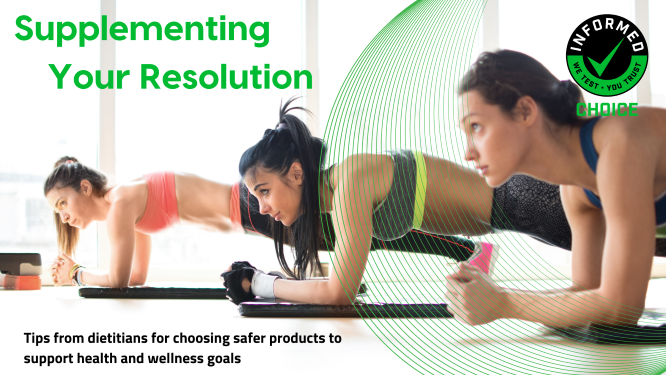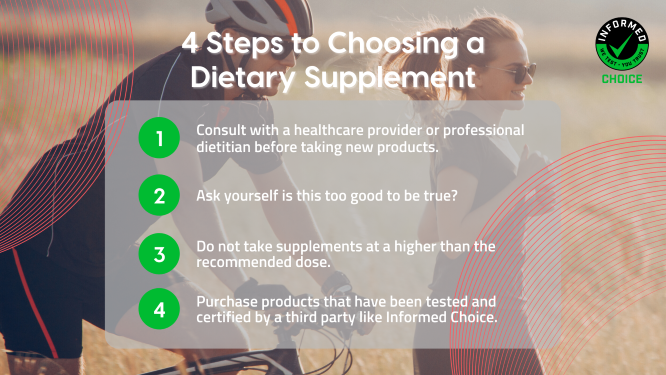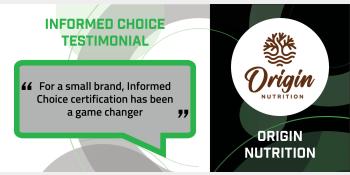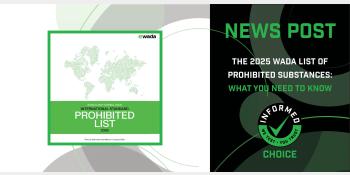Informed Choice News
Supplementing Your Resolution

Tips from dietitians for choosing safer products to support health and wellness goals
As the new year kicks off, many look to set goals and resolutions to make positive lifestyle changes for themselves. These often include aspirations to improve overall health and wellness. According to a study, the most popular resolutions for 2021 were exercising more and improving fitness (50%), losing weight (48%) and improving diet (39%).
In an effort to support exercise and meet dietary goals, many may look to using supplements. According to a 2021 survey from the Council for Responsible Nutrition (CRN), supplement users are more likely to participate in other healthy habits compared to non-users. The pandemic has further increased supplement use with 80% of Americans now using some form of dietary supplement.
Professional Advice
Melanie Sulaver MS, RD, CDN, CISSN, founder and CEO of Nutrition By Mel, recommended the following advice when taking supplements: “The foundation of our health is high-quality nutrition, challenging training, and adequate sleep and recovery. You can’t out supplement poor sleep or a crappy diet. That being said, there are instances in which supplements may be indicated, such as nutrient deficiencies, conditions causing malabsorption, inadequate access to food, and certain life stages like pregnancy.
Mel’s main tips she gives to those making decisions about supplementation are:
- Be skeptical about anecdotal information from those who have no formal training in nutrition, food science, or botanicals. Nutrition retail store employees aren’t always well educated in nutrition or supplementation. I have never met a supplement salesperson concerned with third-party testing, medication interactions, banned substances or the potential risk of products on their shelves.
- If you aren’t sure if the product you’re looking to purchase has undergone third-party testing, reach out directly to the manufacturer. You can ask for a Certificate of Analysis (COA) validating third-party testing to verify that their product meets required specifications. I can’t tell you how many times I’ve done this for clients when verification seals aren’t found on a label or there is limited information on the product's website.”

|
As the consumption of supplements rises, how can you have confidence that you aren’t risking more than you are benefitting from the products you choose? Many are led to believe that if a supplement product is all-natural, legal or obtained from a health food store it must be okay to consume.
Through numerous supplement surveys, our research has shown that 10-15% of supplements sold on the market are contaminated with some form of stimulant or steroid prohibited by the World Anti-Doping Agency (WADA). Even low levels of contamination could pose significant health risks.
This is where third-party testing comes in. Reilly Beatty MS, RD, CSSD, a former top-level collegiate soccer player turned sports dietitian, works with athletes every day and recommends third-party tested supplements. "As a Sports Dietitian, one of my main roles is to help athletes identify safe and effective supplements. When paired with a strong fueling foundation, supplements can help elevate an athlete's performance.
Unfortunately, all supplements are not created equal. Many supplements are poorly regulated and contain undesirable ingredients. This can result in poor health for the athlete, decreases in performance, and positive drug tests. Ensuring your supplement has been 3rd party tested by a trusted organization is essential to avoid these negative effects."
4 Steps to Choosing a Dietary Supplement
What should you do when deciding to use a dietary supplement? Informed Choice recommends following these four steps:
1. Consult with a healthcare provider or professional dietitian before taking new products. Mixing supplements with prescription medications or combining products may cause adverse reactions and side effects.
2. Ask yourself is this too good to be true? Avoid products that claim to cure or treat a disease or other health condition, claim quick-fix weight loss results or are advertised as a substitute for anabolic steroids.
3. Do not take supplements at a higher than the recommended dose (especially those containing stimulants).
4. Purchase products that have been tested and certified by a third party like Informed Choice to ensure it has been manufactured under high-quality standards and is regularly tested for prohibited substances.

|
With a concrete plan and achievable goals, New Year’s resolutions can be a great way to kick-start changes toward a healthier lifestyle. With more users than ever using supplements to support their health and wellness, it's vital for users to have confidence in the products they purchase.
Third-party testing programs like Informed Choice give supplement users peace of mind in the products they choose to support their lifestyle and health goals are regularly tested for banned and potentially harmful substances and are safer for use.










